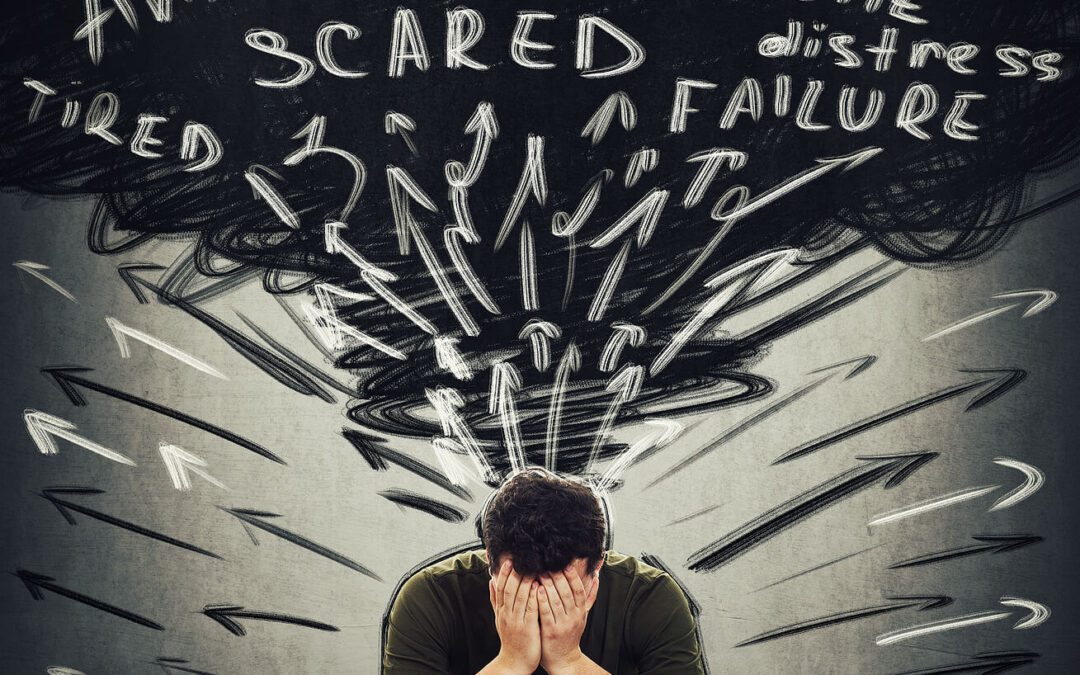Mental health has gained much-needed attention in recent years, with particular focus on how conditions like depression and anxiety impact daily life.
When we think about mental health challenges, we often associate them with emotional distress, social withdrawal, or mood swings. However, the effects of depression and anxiety extend far beyond the emotional realm, affecting how individuals perform both in sports and in the workplace.
 In this blog, we will explore how depression and anxiety manifest in these high-performance environments and the specific ways in which they impair performance in sports and professional settings. Understanding this connection is critical to fostering environments where you can achieve goals in your life.
In this blog, we will explore how depression and anxiety manifest in these high-performance environments and the specific ways in which they impair performance in sports and professional settings. Understanding this connection is critical to fostering environments where you can achieve goals in your life.
Both sports and work environments demand resilience, focus, and motivation.
When an individual is battling depression or anxiety, these mental resources are often depleted, which can lead to a range of performance-related issues. Mental health struggles affect cognitive processes, physical stamina, and interpersonal relationships, which are crucial for success. Listed below are some of the major symptoms of depression and anxiety.
Depression and anxiety often show up together as anxiety is worry about something that has not happened yet or the feeling that something bad is about to happen. Depression is often described as anger turned inward or the feeling of impending doom. Occasionally, we all feel down or sad and or may be anxious about an upcoming event or something; however, prolonged feelings of anxiety or depression can become very problematic. Below is a list of some of the significant symptoms of anxiety and depression.
- Fatigue and lack of energy
- Inability to concentrate or focus
- Feelings of worthlessness or guilt
- Irritability or agitation
- Loss of interest in activities once enjoyed
- Persistent worry or fear
Understanding these symptoms helps us see how mental health issues directly interfere with performance metrics in sports and work.
Depression and Performance in Sports
Decreased Physical Stamina
One of the primary ways depression affects both athletes and non-athletes is by reducing physical energy levels. Depression is often accompanied by fatigue and lethargy, which can make training sessions and competitions extremely challenging. Even if athletes want to perform at their best, they may struggle with basic physical functions such as endurance, strength, and speed. A loss of energy can be devasting at work and in competition, as we may not be able to sustain performance levels or workouts. This, in turn, may increase the feelings of depression and anxiety as we then become more concerned we will not be able to meet expectations, which may then trigger feelings of failure and increase the worry about upcoming events. This quickly becomes a treadmill or hamster wheel of thoughts, feelings, and behaviors that can keep us stuck in these emotions.
Mental Fatigue and Loss of Focus
Depression can cloud an athlete’s judgment and focus. Sports and many jobs require sharp mental acuity — athletes must make split-second decisions, strategize on the fly, and stay mentally engaged throughout the duration of a game or match. Depression, however, often saps the ability to concentrate and stay present, leading to poor decision-making, costly mistakes, and subpar performance. In equestrian sports, focus is crucial as we must be able to manage our own ability and be aware of the horse we are riding. Being able to stay focused on multiple things at one time is essential. Even at work, staying focused and attentive is important.
It becomes easier to see if we think of our jobs as performances. Work is performance, as many of you may receive performance reviews and evaluations of how you are doing at your job. The consequence of not performing at work could be missed opportunities for promotions or pay increases. It could be not placing in the event or injury in sports and equestrian sports. Losing focus and poor performance, once again, may lead to thoughts and feelings of failure, thus keeping us stuck on the hamster wheel of anxiety and depression.
Loss of Motivation
Depression often causes a significant loss of interest in activities that once brought joy, including sports. For athletes, this can manifest as a lack of motivation to train, compete, or even show up for practices. This can show up in the workplace as losing interest in work and co-workers or customers. Work can become drudgery, and the sports we were so excited about doing can become chores, and even simple things seem to take more energy, time, and effort than in the past. This dread of doing things, even those we once enjoyed, again helps maintain the hamster wheel of negative thoughts and feelings.
Social Isolation
Athletes often function as a team, relying on communication and collaboration with teammates, coaches, and other supportive people. Depression and anxiety may lead to social withdrawal, often due to many of the symptoms listed above, and increase a sense of fear, failure, or disappointment that may make it difficult for athletes and individuals to connect with others and maintain relationships with those important to them.
Anxiety and Performance
Performance Anxiety
Anxiety disorders, especially performance anxiety, are common in sports. Athletes face immense pressure to perform, which can trigger overwhelming fear and worry. In equestrian sports, we do many things, such as posting and leg position, holding the reins we do from what is often termed muscle memory, and we do without thinking. We want to be in this state, not thinking about specific body movements but rather doing and responding to the horse almost instinctively. Anxiety or thinking about what we are doing inhibits this process considerably.
When we do a physical activity, we need a certain amount of energy to perform the activity. We say we are going to do something important to us, and we need to have energy. The brain will then release adrenaline and tell some symptoms to get ready to work hard, creating the sense of stomach butterflies, sweating, and increased arousal levels. The bigger the event or, the more we say this is a big deal, the more adaline our body may produce and overload us.
In this state, instead of being able to perform efficiently, it becomes very difficult to concentrate or move as the muscles become tense instead of loose, and we start “thinking” about what we are supposed to do. This hyper-awareness of thoughts and movements may lead us not to be able to perform at all, thus leading again to feelings of failure and again keeping us on the hamster wheel of anxiety and depression.
Perfectionism
 Many equestrian athletes struggling with anxiety are also perfectionists, constantly afraid of making mistakes or underperforming. This fear of failure can create an unhealthy mindset, where the athlete places excessive pressure on themselves, leading to burnout or injury. Perfection is much better looked at as something to strive for rather than obtain. In part, perfection is not sustainable because something may be perfect for an instant, then something changes, and it is no longer perfect. Thinking that perfection is the goal can lead to increased anxiety and thus to decreased performance because of thinking about perfection instead of doing the behavior. This often leads to more fear that it will not be done perfectly, so we may not practice since we do not want to fail, thus increasing the likelihood of not doing the behavior well, so we are back on the hamster wheel.
Many equestrian athletes struggling with anxiety are also perfectionists, constantly afraid of making mistakes or underperforming. This fear of failure can create an unhealthy mindset, where the athlete places excessive pressure on themselves, leading to burnout or injury. Perfection is much better looked at as something to strive for rather than obtain. In part, perfection is not sustainable because something may be perfect for an instant, then something changes, and it is no longer perfect. Thinking that perfection is the goal can lead to increased anxiety and thus to decreased performance because of thinking about perfection instead of doing the behavior. This often leads to more fear that it will not be done perfectly, so we may not practice since we do not want to fail, thus increasing the likelihood of not doing the behavior well, so we are back on the hamster wheel.
Depression and Anxiety in the Workplace
Mental health issues are equally impactful in the professional world, where depression and anxiety can significantly impair an individual’s ability to work effectively.
Reduced Productivity
One of the most noticeable effects of depression and anxiety in the workplace is reduced productivity. A lack of energy, focus, and motivation makes it difficult for employees to complete tasks efficiently or meet deadlines. Depressive symptoms such as lethargy and a sense of hopelessness can make even simple tasks feel insurmountable, leading to procrastination and again leading to negative thoughts and feelings.
Anxiety, meanwhile, can result in overthinking, difficulty making decisions, and the constant fear of not meeting expectations. This can cause an individual to spend excessive time on minor details or become paralyzed by indecision, further reducing overall productivity and leading to more negative thoughts and feelings and hamster wheel thinking.
Absenteeism and Presenteeism
Depression and anxiety often lead to increased absenteeism — employees may frequently call in sick or take mental health days. Chronic absenteeism can strain teams and hinder organizational progress.
Conversely, presenteeism, where employees come to work despite being unwell, is also a common outcome. Employees dealing with depression or anxiety might show up to the office but remain disengaged, unable to contribute effectively. They may spend hours at their desks without accomplishing much, which can create a cycle of guilt and further exacerbate mental health issues.
Interpersonal Conflicts and Isolation
Just as in sports, mental health conditions can affect workplace relationships. Depression often causes individuals to withdraw socially, which can be interpreted by co-workers as aloofness or disinterest. Anxiety can manifest as irritability, leading to conflicts or misunderstandings in the workplace. Over time, these strained relationships can create a toxic work environment, making it harder for individuals to collaborate effectively.
Difficulty in Decision-Making and Problem Solving
Mental clarity and decisiveness are critical in the professional world, where employees must make important decisions or solve complex problems. Depression and anxiety interfere with these cognitive processes. Employees dealing with these conditions might second-guess themselves, make poor choices, or feel paralyzed when faced with a challenge. This cognitive impairment can limit career growth and job satisfaction.
In work and equestrian sports and sports, it is important to recognize how our thoughts affect our ability to perform at either.
Physical exercise is then listed as a way to help with depression, and this is true; however, in sports, when doing physical activity becomes a thing of dread, it loses the ability to help lower depression. Wanting to perform well at our jobs or our sports is positive; however, worrying that we will not do it correctly, so we no longer do the activity, or we end up not doing it as well as we wanted, so we then do not want to do the activity. Managing how we think about our sports and work performance is essential.
Open Dialogue:
Coaches, managers, and colleagues should create a culture where discussing mental health is encouraged, reducing the stigma around seeking help.
Access to Mental Health Resources:
Both athletes and employees need to have access to counseling services and stress-relief programs.
Life Balance:
Overtraining and overworking can exacerbate anxiety and depression. Balancing personal time and professional or athletic commitments can help individuals maintain their mental well-being.
Stress-Management Programs:
Mindfulness training , relaxation techniques, and other coping strategies can help reduce the impact of anxiety and depression.
, relaxation techniques, and other coping strategies can help reduce the impact of anxiety and depression.
Specific therapies can also help with anxiety and depression in sports and work.
EMDR
EMDR can help with reprocessing memories and healing the trauma from the past. It is also helpful in allowing us to see ourselves doing a particular behavior or task that we want to do correctly, increasing the chances that when we perform the activity, we will do it correctly. EMDR can also help to lower anxiety with growing skills to help improve the sense of calm and tolerance of distress. It can also help increase positive experiences and use them to help manage anxiety in the present; for more information on how EMDR can be helpful, see my EMDR page or previous blogs about its benefits.
Equine Therapy
Equine therapy can help us develop relationships and understand ourselves better. Horses are intuitive animals and often reflect what is happening to us even when unaware. Developing a relationship without words and learning to work with the horses helps us understand ourselves and how we interact. See my equine therapy page to learn more about equine therapy and its benefits.
Acceptance Commitment Therapy can also help change thoughts and allow us to step off the hamster wheel. Learning to recognize how we think and then to be able to learn to change our thoughts which in turn will change how we see ourselves and how we behave towards ourselves and others. Change is possible, and learning about our thoughts and what we say to ourselves is critical to changing how we perform at work or in our chosen sport. Please see my page or previous blogs to learn more about how ACT or cognitive behavioral therapy can help you.
Start Working With a Depression and Anxiety Therapist in Richmond, VA, and Across the State!
Depression and anxiety are invisible adversaries that have far-reaching consequences on performance in sports and the workplace. Recognizing the symptoms and impacts of these mental health issues is the first step in providing support. By fostering environments that prioritize mental well-being, we can help individuals perform to the best of their abilities, both physically and mentally.
If you would like to learn more about how Gray Horse Counseling can help with anxiety or depression in sports or work, follow these simple steps to get started:
- Contact me to schedule a free consultation.
- Check out my FAQs and read more about me
- Start improving on a personal and professional level today!
Other Services Offered with Gray Hourse Counseling
Therapy for depression and anxiety are not the only services offered by Gray Horse Counseling. I’m happy to offer therapy for men and a variety of other services to support the mental health of folks in Powhatan, VA, and across the state via online therapy. Other services at Gray Horse Counseling include individual therapy, self-esteem therapy, group therapy, equine sports, clinical supervision, trauma therapy, and equine therapy. Check out my FAQs, read about me, and contact me today to get the help you deserve!

